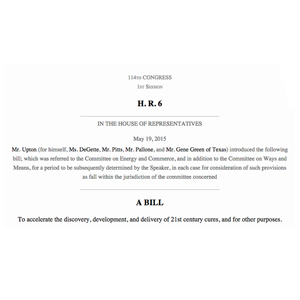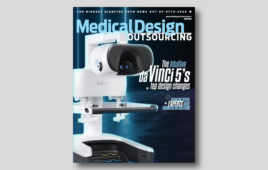 There’s a lot to praise about the 21st Century Cures Act passed by the U.S. House in July. It adds much-needed funding to the National Institutes of Health, as well as reducing the bureaucratic and administrative burden on researchers. Further, it aims to provide for funding regardless of political climate. Specifically, the act establishes $1.86 billion in mandatory funds per year for FY2016 through FY2020, for initiatives including biomedical research, cures development, an accelerating advancement program, high-risk/high-payoff research, and support for early career researchers. NIH’s overall budget will increase from $3.1 billion in 2016 to $3.4 billion by 2018, with particular emphasis on biomedical research on critical diseases, such as cancer.
There’s a lot to praise about the 21st Century Cures Act passed by the U.S. House in July. It adds much-needed funding to the National Institutes of Health, as well as reducing the bureaucratic and administrative burden on researchers. Further, it aims to provide for funding regardless of political climate. Specifically, the act establishes $1.86 billion in mandatory funds per year for FY2016 through FY2020, for initiatives including biomedical research, cures development, an accelerating advancement program, high-risk/high-payoff research, and support for early career researchers. NIH’s overall budget will increase from $3.1 billion in 2016 to $3.4 billion by 2018, with particular emphasis on biomedical research on critical diseases, such as cancer.
The act also has several provisions covering the FDA’s role in device and drug approvals. The bill, as written, accepts alternatives to multiphase clinical trials in certain circumstances, and permits accelerated approval pathways for certain classes of drugs, such as novel antibiotics. Under the new criteria, the federal safety agency may consider not only randomized clinical trial data, but also observational studies, registries and therapeutic use as evidence of efficacy for drug and device approvals.
David Rosen, a partner with Foley & Lardner, says this provision is a significant win for medical device companies struggling to design clinical trials for medtech. In many cases, Rosen told Medical Design & Outsourcing, the agency reviewer asks too much from developers. For example, consider biocompatibility testing. If a skin-contact device uses materials approved for implantable, you shouldn’t have to do exhaustive tests on them because, Rosen says, “in that case, the likelihood of toxicity is low. An irritation and sensitization study should be enough; you don’t need a full toxicity workup.”
Rosen explains the important issue at play here is that the FDA will have direction on how Congress expects the agency to work. He praises FDA leaders and CDRH director Dr. Jeffery Shuren, noting that leadership has done good work on making the agency more accessible to product developers. Rosen says the agency’s efforts to streamline submissions have been successful in his experience. But, as the agency evolves over time, “it’s good to get feedback on what Congress expects.”
For Rosen, funding for training of FDA staff in “least burdensome” pathways is critical. “There is new talent in the agency, and they don’t always have the benefit of institutional knowledge,” he notes, adding that FDA reviewers are smart people who take their jobs seriously.
“FDA wants to protect the public, but its people would benefit from mentorship,” Rosen says. The 21st Century Cures Act helps institute timeliness and accountability for the agency, he added.
Many of the aims of the measure, however, are hotly debated. What makes the act so open to controversy is the sheer volume of regulation it tries to cover. The key trouble stems from special interest riders, which make the bill complex and full of concessions. Drs. Jerry Avorn and Aaron Kesselheim discussed their opposition to the act in an editorial in the New England Journal of Medicine, arguing against accelerated drug approvals.
“Embedded in the language of the 21st Century Cures Act are some good ideas that could streamline the development and evaluation of new drugs and devices; its call for increased NIH funding may prove to be its most useful component. But political forces have also introduced other provisions that could lead to the approval of drugs and devices that are less safe or effective than existing criteria would permit,” Avorn and Kesselheim wrote.
For medical devices, the criticism from Avorn and Kesselheim feels less relevant. They say it continues a to support a “lack of rigor” in the area of medical devices and criticize the third-party quality systems regulation analysis, saying it authorizes companies to assess their own products.
Most medtech analysts would disagree, however. Rosen says third-party QSRs will alleviate FDA’s burden and help industry self-regulate.
Vascular Sciences president Michael Drues told us he’s seen this type of schizophrenia in medtech for a long time.
“We medical devices to be safe, but we also want to lead in terms of getting technology to the market faster,” Drues explains. And while both are noble goals, says Drues, they are in some sense oppositional. Still, says Drues, you can have “good” regulation and “great” innovation existing simultaneously.




![A photo of the Medtronic GI Genius ColonPro polyp detection system flagging a potential sign of colon cancer during a colonoscopy. [Photo courtesy of Medtronic]](https://www.medicaldesignandoutsourcing.com/wp-content/uploads/2024/04/Medtronic-GI-Genius-doctors-268x170.jpg)